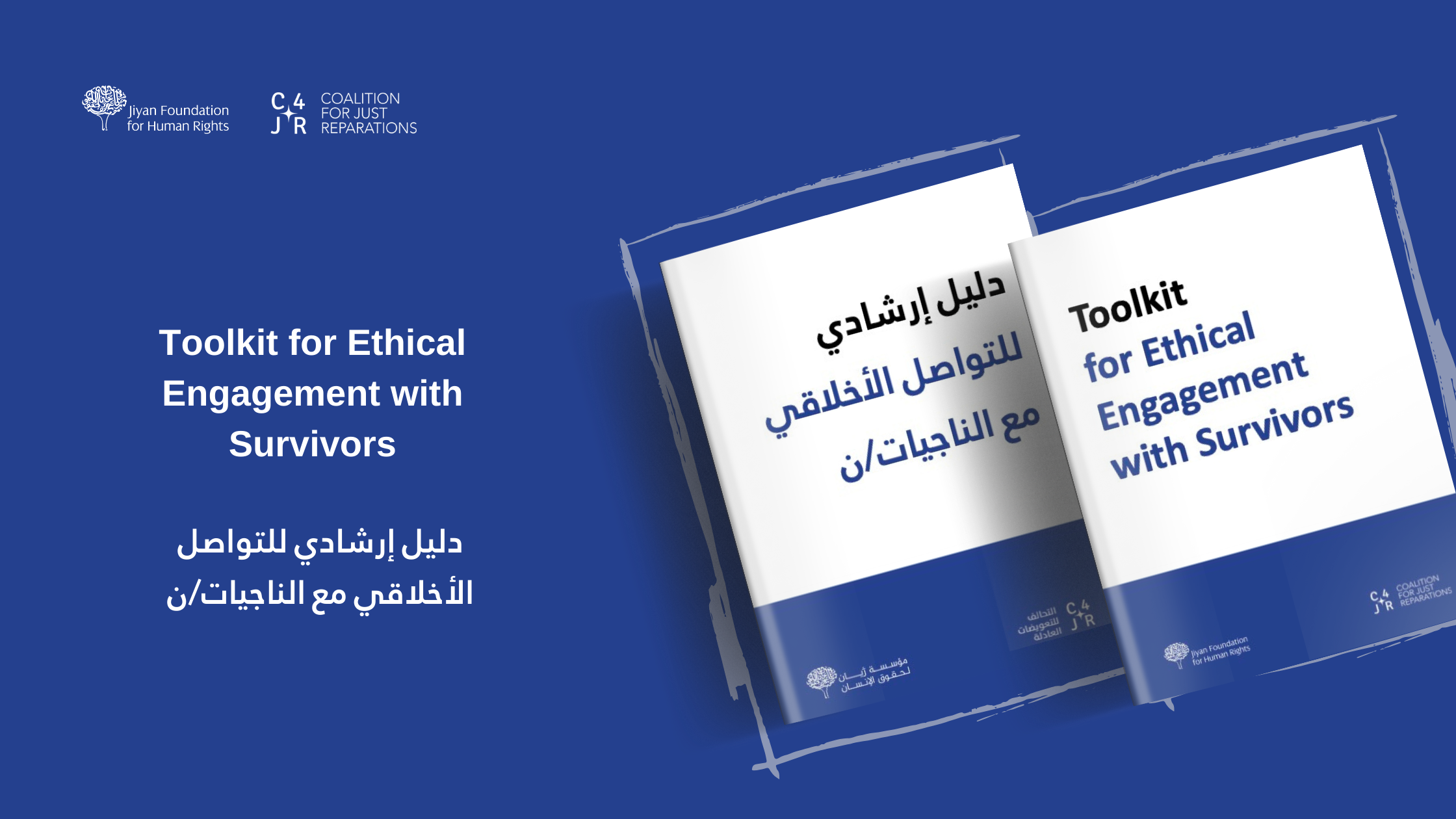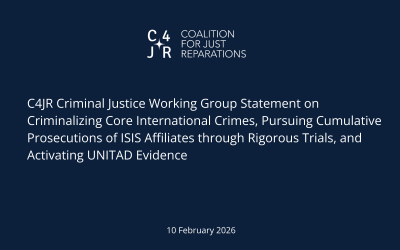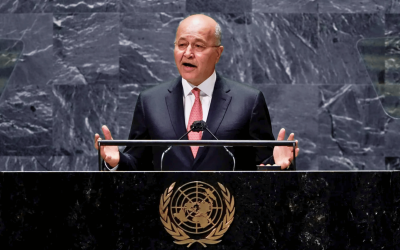Erbil, Iraq — The Coalition for Just Reparations (C4JR) and Jiyan Foundation for Human Rights are proud to introduce our new Ethical Engagement Toolkit, a groundbreaking resource designed to guide ethical and respectful interactions with survivors of human rights violations in Iraq. This toolkit, which expands on C4JR’s Media Guidelines and Checklist, was meticulously developed with input from survivors and experts, and sets a new standard for trauma-informed and survivor-centred engagement practices, aiming to empower survivors, ensuring that their stories are shared with dignity, respect, and sensitivity.
The release of this toolkit is especially significant as 2024 marks ten years since the self-proclaimed Islamic State of Iraq and the Levant (ISIL) began its genocidal campaign against members of the Yazidi, Turkmen, Christian, and Shabak communities. A decade since the atrocities committed by ISIL, the urgent need for justice, reparations, and ethical and compassionate engagement with survivors who continue to live with the trauma of these events remains a necessity.
Ethical engagement with survivors is not just a moral imperative; it is a necessity to ensure their voices are heard with dignity and respect. This toolkit was drafted by Sherizaan Minwalla, a human rights lawyer, founder of Taboo LLC, and consultant with the Jiyan Foundation for Human Rights, and developed with contributions from Yusra Al-Kailani, Resilience Programming Trainer at the Center for Victims of Torture (CVT). The toolkit is available to download in English and Arabic, along with annexes included below.
Sherizaan stresses that, “Survivors have repeatedly shared experiences of being treated disrespectfully, pressured to discuss traumatic events before they are ready, and having their identities revealed without informed consent. This Toolkit provides practical guidance to promote informed consent practices, empowering survivors to advocate for themselves and choose what and when to share. I hope journalists, NGOs and others apply these practices and tools, because it reflects the changes survivors want to see.”
Key Features of the Toolkit:
1. Informed Consent: Detailed guidance to ensure that survivors fully understand and voluntarily agree to participate in media interviews, public events, and documentation efforts. This process includes discussing the benefits, risks, and long-term implications of sharing their stories.
2. Confidentiality and Privacy: Protocols to protect the personal information and identities of survivors, preventing re-traumatization and ensuring their safety. The toolkit emphasises the need for secure handling of sensitive data and respecting survivors’ boundaries.
3. Cultural Sensitivity: Emphasis on respecting the cultural and social contexts of survivors, with appropriate language and terminology usage. The toolkit provides guidance on how to engage with survivors from diverse backgrounds, ensuring that their unique experiences are honoured.
4. Support and Empowerment: Protocol tools for C4JR members to manage requests from journalists and others to participate in interviews and other events, beginning with the request form to gather accurate information and then guidance on how to evaluate preparedness and how to approach survivors. Rather than just sending survivors out, the guidance helps them to prepare for public engagements, including mentorship, emotional support mechanisms, and practical resources. This support ensures that survivors feel empowered and confident when sharing their stories.
5. Practical Resources: The toolkit includes checklists, consent forms, feedback mechanisms, and other practical tools to facilitate ethical engagements. These resources are designed to be user-friendly and adaptable to various contexts.
“The media often portrays survivors through a narrow lens, focusing on their victimhood rather than their resilience. This toolkit aims to change that narrative by empowering survivors to share their stories on their terms,” says Dr. Bojan Gavrilovic, Head of Program for Rights and Justice at Jiyan Foundation. “This toolkit represents a significant step forward in our commitment to supporting survivors of ISIL atrocities. By providing clear guidelines and practical tools, we aim to create a safe and respectful environment for survivors to share their stories.”
The launch of the Ethical Engagement Toolkit is timely, coinciding with the tenth anniversary of the ISIL genocide on August 3, 2014, when ISIL launched a brutal campaign against the Yazidi community and other minorities, resulting in mass killings, abductions, and unimaginable suffering. This toolkit is a testament to the resilience of survivors and a call to action for ethical and respectful engagement with them.
Downloads:
Toolkit for Ethical Engagement with Survivors [Arabic, English]
Annexes
Annex A: Survivor Participation Request Form [Arabic, English]
Annex B: Preparedness Checklist [Arabic, English]
Annex C: Trauma Informed Engagement Checklist [Arabic, English]
Annex D: Informed Consent Checklist [Arabic, English]
Annex E: Consent for Use of Images and Identifying Information [Arabic, English]
Annex F: Consent for Participation in Events Including Media Engagements [Arabic, English]
Annex G: Event Feedback Form (Survivors) [Arabic, English]
Annex H: Event Feedback Form (C4JR / members) [Arabic, English]
Annex I: Tips for NGOs about Survivors’ Rights [Arabic, English]
Annex J: Message from NGOs to Survivors [Arabic, English]
Annex K: Informed Consent for the Media Engaging with Survivors [Arabic, English]
About the Jiyan Foundation for Human Rights: The Jiyan Foundation for Human Rights supports survivors of human rights violations by providing mental health and medical treatment, along with other support services, across Kurdistan, Iraq, and Syria.
About C4JR: C4JR is an alliance of Iraqi organisations advocating for comprehensive reparations for survivors of ISIL atrocity crimes. The coalition promotes survivor-centric practices that do no harm, providing a safe space for survivors to collaborate and articulate their priorities.



